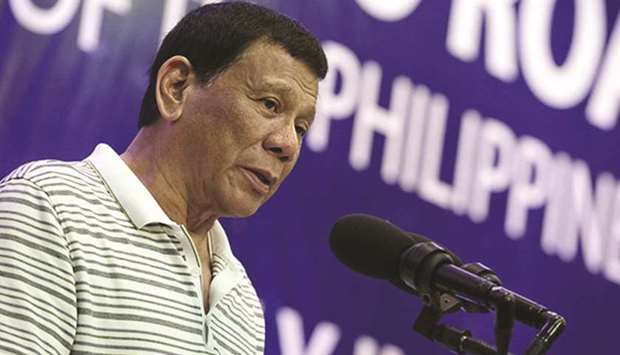Millions of Filipinos head to the polls tomorrow to vote for new lawmakers and local officials in mid-term elections seen as cementing Philippine President Rodrigo Duterte’s popular rule in the country.
While a slew of issues confront the country ahead of the May 13 polls, voters are expected to choose candidates allied with Duterte regardless of their positions on the violent campaign against illegal drugs and the territorial dispute in the South China Sea, among others. More than 61mn Filipinos are registered to vote for half of the 24-seat Senate, more than 240 members of the House of Representatives and nearly 20,000 provincial and municipal officials in the elections.
Duterte has been actively campaigning for his candidates, especially in the Senate, which has become a “battleground” for his controversial bills such as a proposal to change the country’s form of government and to cut corporate taxes to attract more investments.
Opposition senators have also led high-profile investigations into allegations of irregularities against the 74-year-old leader and his family in the past three years of his term.
But latest surveys show that Duterte’s candidates, including his former close aide Christopher Go and ex-police chief Ronald Dela Rosa, would dominate the Senate race despite the unabated criticisms against him and his policies.
“This likely means the last institutional bastion of the opposition will have fallen,” noted Mark Thompson, a politics professor and director of the Hong Kong-based Southeast Asia Research Centre. The expected electoral tsunami will likely enable Duterte to further consolidate his illiberal populist rule,” he added.
“Duterte has transgressed even the limited constraints on his power in a ‘hyper-presidentialist’ system such as the Philippines.”
The main opposition group, the Liberal party, has been struggling with limited resources and ground support in the campaign. The party also has only fielded eight candidates in the Senate race.
In the latest survey by research group Pulse Asia Research Inc, only two candidates from the Liberal Party could possibly win a seat in the Senate and they are both trailing behind.“We need a miracle,” admitted Senator Francis Pangilinan, campaign manager of the Liberal Party’s Otso Derecho (Straight Eight) slate.
Analysts noted that even if opposition candidates were raising valid concerns against the Duterte administration and his policies, these issues have not influenced voters as elections in the Philippines remain personality-driven.
Human rights abuses in a violent campaign against illegal drugs that has left thousands killed, subservience to China over territorial disputes in the South China Sea and high inflation are among the issues being raised by the opposition.
Despite the criticisms, Duterte continues to enjoy high popularity ratings, with 79% of Filipinos satisfied with his performance, according to the latest survey by Social Weather Stations.Only 13% were dissatisfied and 8% undecided, according to the first-quarter nationwide poll.
“We have been convincing ourselves for the longest time that our politics is characterised by ideologies, but it started and remains to be mainly but a battle of personalities,” said Edmund Tayao, a local governance professor at the Ateneo School of Government.
The mid-term elections could be a crossroad for Philippine politics, Tayao said, noting that Duterte’s election in May 2016 was the start of an “experimental path” to implement systemic change.
Duterte, largely seen as an outsider in the Philippine political system, has definitely altered the landscape of politics and governance in the country with his tough-talking, no-nonsense style.
While many believe that some killings in his anti-drug war were not justified, majority still support the crackdown because their neighbourhoods feel safer after petty criminals and drug addicts are rounded up or killed, surveys showed.
Duterte has also taken on the business elites, penalising companies that fail to provide good service to the public.
One of the two main water providers was slapped with a huge fine in the wake of a supply shortage that left taps dry for weeks in Manila. He has also shut down the country’s premier tourist destination for a long overdue clean-up and rehabilitation that no other president has been able to accomplish.
“The choices we make (in Monday’s elections) will show if there can still be real change that we can hope to have in our politics and therefore have the kind of governance we deserve,” Tayao noted.
“To be a really systemic change however, it cannot just be a re-drawing of power relations between the centre and the periphery; it should essentially be changing the ‘rules of the game’,” he added.

Duterte: greater support?
